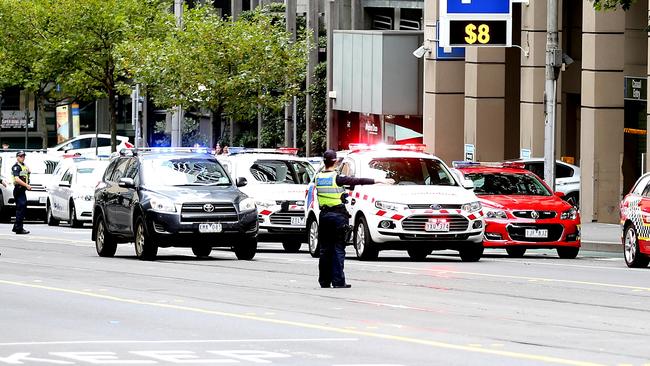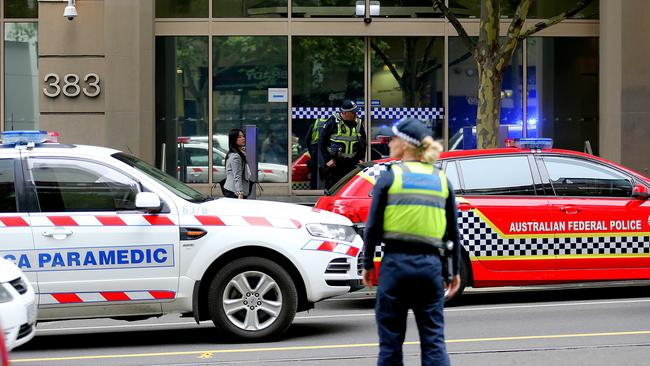AFP whistleblower: ‘A whole lot of ticking time bombs’ in police force
EXCLUSIVE: They’re exposed to child sexual abuse, terror threats and grisly crimes each day. And it’s taking a deadly toll on AFP officers.
EXCLUSIVE
A WHISTLEBLOWER from within the AFP has alleged several Victorian members have died in the past year and others are at high risk of suicide because they have limited access to support services.
The AFP officer, who spoke to news.com.au on the condition of anonymity, claimed to be aware of two cases in Victoria where colleagues had taken their own lives, with dozens more at risk because of depression and mental health issues.
“It’s like looking at a whole lot of ticking time bombs and wondering which one will go off,” he said.
His comments come after a female AFP officer was killed by a gunshot inside the AFP Melbourne headquarters around 5.45pm yesterday. She was transported to hospital but later died.
AFP Commissioner Andrew Colvin confirmed the woman’s death was “not suspicious” or accidental. Police are still investigating and will prepare a report for the coroner.
The confidential AFP officer, who has been with the organisation for more than a decade, said it was “not the first AFP suicide in the past 12 months”.
“I’m aware of two - one was a returned international deployment officer,” he said.
“When the AFP found out (the member) didn’t do it with their own deployment pistol, they didn’t want to know about it.
“There was another incident in Sydney where one (member) came close.”
The AFP did not respond to questions from news.com.au about how many members had died from suicide in the past year or past five years.
News.com.au’s source said the extreme mental health and suicide risks to members was a result of exposure to traumatic situations with limited support or training on how to cope.
He said AFP members were also often afraid to seek help because of the “stigma around PTSD, anxiety and depression”.
“There were a lot of instances where officers did forensic procedures after the Bali bombings where they collected men, women and children’s bodies; others were involved in the aftermath of the downing of MH17; transnational sexual slavery and servitude; some grade tens of thousands of child pornography images a day; others deal with terrorism.
“In the area I’m working in alone, there are at least 10-15 officers that are medicated, should be medicated and should be seeking treatment.
“They’re just the ones I know of personally.”
He claimed the AFP has “resisted change” and ignored calls from members to implement better support services for those struggling with post traumatic stress disorder (PTSD), anxiety and depression.
“It’s cheaper to hire new people than fix the ones you broke,” he said.
“It’s like we’ve been standing on the side of a road saying ‘there should be traffic lights here’, jumping up and down for a year, then someone is hit by a car.”

The AFP told news.com.au it “provides all staff with nationwide access to a 24 hour Employee Assistance Program in addition to support from AFP Wellbeing in the form of internal psychologists, nurses, chaplains, work health and safety advisers, rehabilitation case managers and a Consulting Medical Officer”. It also offers support services to all members following critical incidents.
“All Police and Protective Service Officers receive mental health training to assist them in dealing with members of the public and recognise warning signs within themselves and their colleagues,” they said in a statement.
But the AFP officer who spoke to news.com.au about working inside the organisation, said members outside the Australian Capital Territory are “100 per cent reliant on an Employee Assistance Program which is farmed out to Davidson Trahaire Corpsych (DTC) Services”.
“The members have to contact them,” he said.
“There is nothing in the workplace to identify or pick up anyone at risk.
“Once members do contact the EAP, it’s ineffective because there’s limited access to appointments, and they can’t guarantee getting the same person each time you go.
“So you spend a large portion of the session rehashing what you told the last person.”
But the challenge of combating mental health issues within the AFP extends beyond limited resources and support services. It’s also a cultural issue, according to the source.
He said AFP members were afraid of how they would be perceived if they admitted they were having problems.
“The moment you start admitting you are seeing someone they put you on light duties,” he said.
“It makes members not want to reach out at all.
“The moment you’re put on light duties, you’re no good to anyone, you’re looked at in a different light.
“There’s still a huge amount of stigma around PTSD, anxiety and depression even though it’s very common for AFP members to suffer mental health issues.”
The AFP source said the bulk of members work outside the ACT but the majority of resources were based in the capital.
“There are no support services that are accessible or early interventions in the regional areas,” he said.
The “AFP relies on Comcare to pay out claims, so it can be reimbursed”, according to the source.
“They defer the responsibility to workplace injury management but they only operate in the realm of an active Comcare claim,” he said.
“Because of the issues with Comcare, if you go through and put in a claim, you are not going to recover.
“You spend the next 12 months of your life being hassled by an organisation that is fundamentally an insurance company that wants to avoid paying out on claims.”

The source said the AFP should look to model itself on the Defence Department which has a “very solid program in relation to PTSD help”.
“There are a huge amount of organisations like Black Dog, Beyond Blue and a whole range of other ones that put all this effort into study and support programs that could be delivering self help to AFP members so they can help themselves and identify the signs in others,” he said.
“Rather than make these people feel there’s nowhere to turn, make them feel better and supported and like people care about them.”
He said it was important the public got behind AFP members who are among those on the front line of defence against terror attacks in Australia.
“The only reason there hasn’t been a successful attack terror (in Australia) is because of the work front line staff and agencies are doing here,” he said.
“The people (plotting terror attacks) are here, and they have the motives and means to do the attacks.
“The more you lose through suicide, the closer Australia comes to a large scale attack.”
If you or someone you know needs help, phone Lifeline on 13 11 14 or the 24-hour Suicide Call Back Service 1300 659 467.
If you have information on issues within the AFP please contact megan.palin@news.com.au




